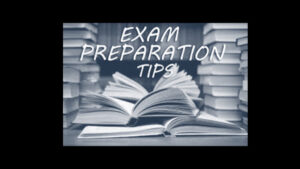Table of Contents
Introduction
Exam Preparation Tips: Preparing for Central Board of Secondary Education (CBSE) exams requires a strategic and well-planned approach. Whether you are preparing for Class 10 or Class 12 exams, here are some tips to help you perform well in your CBSE exams
CBSE Exam Preparation Tips
- Understand the Syllabus:
- Familiarize yourself with the CBSE syllabus for your class and subjects. Knowing what topics are included will help you organize your study plan.
- Create a Study Schedule:
- Develop a realistic and balanced study schedule. Allocate specific time slots for each subject, and make sure to include breaks to avoid burnout.
- Prioritize Weak Areas:
- Identify your weak areas in each subject and prioritize them in your study plan. Devote more time to challenging topics while maintaining a balance with easier ones.
- Use NCERT Books:
- CBSE exams are based on NCERT textbooks. Ensure that you thoroughly read and understand the concepts presented in these books. Pay attention to examples and exercises.
- Practice Regularly:
- Practice solving sample papers, previous years’ question papers, and additional exercises. Regular practice helps in understanding the exam pattern and enhances problem-solving skills.
- Make Notes:
- Create concise and clear notes for each subject. Summarizing information in your own words can aid in better understanding and quick revision.
- Revision is Key:
- Regularly revise what you’ve learned. Create a revision schedule closer to the exam date to reinforce your memory and boost confidence.
- Stay Healthy:
- Maintain a healthy lifestyle during your exam preparation. Get adequate sleep, eat a balanced diet, and exercise to keep your mind and body in optimal condition.
- Seek Help When Needed:
- If you encounter difficulties with certain topics, don’t hesitate to seek help from teachers, classmates, or online resources. Clarify your doubts promptly.
- Practice Time Management:
- Practice solving papers within the specified time limits. Time management is crucial during exams, so get accustomed to answering questions under timed conditions.
- Stay Positive:
- Cultivate a positive mindset. Believe in your abilities and stay confident. Positive thinking can enhance your performance during exams.
- Take Breaks:
- While studying is essential, it’s equally important to take breaks to avoid burnout. Short breaks can refresh your mind and improve concentration.
- Stay Informed About Exam Patterns:
- Stay updated on any changes in the exam pattern or marking scheme. Familiarity with the structure of the exam can contribute to better performance.
- Mock Tests:
- Take mock tests to simulate exam conditions. This will help you get accustomed to the actual exam environment and improve your time management skills.

CBSE Practical Exam 2024 Preparation Tips
Preparing for CBSE practical exams requires a combination of understanding theoretical concepts and developing hands-on skills. Here are some tips to help you prepare for CBSE practical exams
Also, Read CBSE Class 12 Date Sheet 2024
- Understand the Syllabus:
- Familiarize yourself with the practical syllabus for each subject. Know the experiments, projects, and activities that are part of your curriculum.
- Review Lab Manuals:
- Go through your lab manuals thoroughly. Understand the procedures, precautions, and expected outcomes for each experiment. Make sure you can explain the steps involved.
- Practice Regularly:
- Regular practice is crucial for practical exams. Perform experiments multiple times to become familiar with the techniques and equipment. This will enhance your confidence during the actual exam.
- Note Down Observations:
- While conducting experiments, keep detailed records of your observations. This will help when writing the practical record and answering questions related to the experiments.
- Prepare for Viva Voce:
- Be prepared for viva voce (oral examination) as part of the practical assessment. Revise theoretical concepts related to the experiments and be ready to answer questions from the examiner.
- Organize Your Practical Records:
- Maintain well-organized practical records. Ensure that your records include the aim of the experiment, apparatus used, procedure followed, observations made, and conclusions drawn.
- Focus on Accuracy:
- Pay attention to the accuracy of your practical work. Practice measuring and recording data precisely. This is particularly important in subjects like Physics and Chemistry.
- Understand the Application:
- Understand the real-world applications of the experiments you are performing. This knowledge can help you answer questions more comprehensively during the practical exam.
- Time Management:
- Practice managing your time efficiently during the practical exam. Be aware of how much time each experiment takes, and allocate time appropriately to complete all tasks.
- Be Thorough with Safety Measures:
- Understand and follow safety measures while conducting experiments. This includes using safety equipment, handling chemicals properly, and adhering to guidelines for each experiment.
- Seek Guidance from Teachers:
- If you have any doubts or concerns, don’t hesitate to seek guidance from your teachers. They can provide clarification on procedures, concepts, and expectations.
- Prepare for Project Work:
- If your practical exams involve project work, ensure that you are well-prepared. Understand the project’s objectives, and methodology, and be ready to explain your findings.
- Practice with Lab Partners:
- If possible, practice with your lab partners. Collaborative practice can help you learn from each other, share insights, and improve your overall performance.
- Stay Calm and Confident:
- Approach the practical exams with a calm and confident mindset. Remember that examiners are assessing your understanding and application of concepts, not trying to catch you off guard.
- Review Previous Years’ Papers:
- Reviewing previous years’ practical exam papers can give you an idea of the types of questions and experiments that might be included. It can help you anticipate what to expect.
